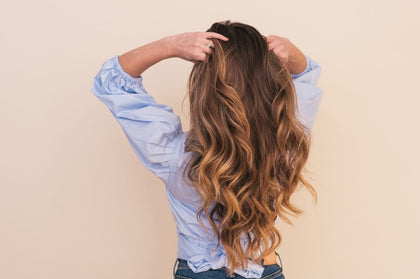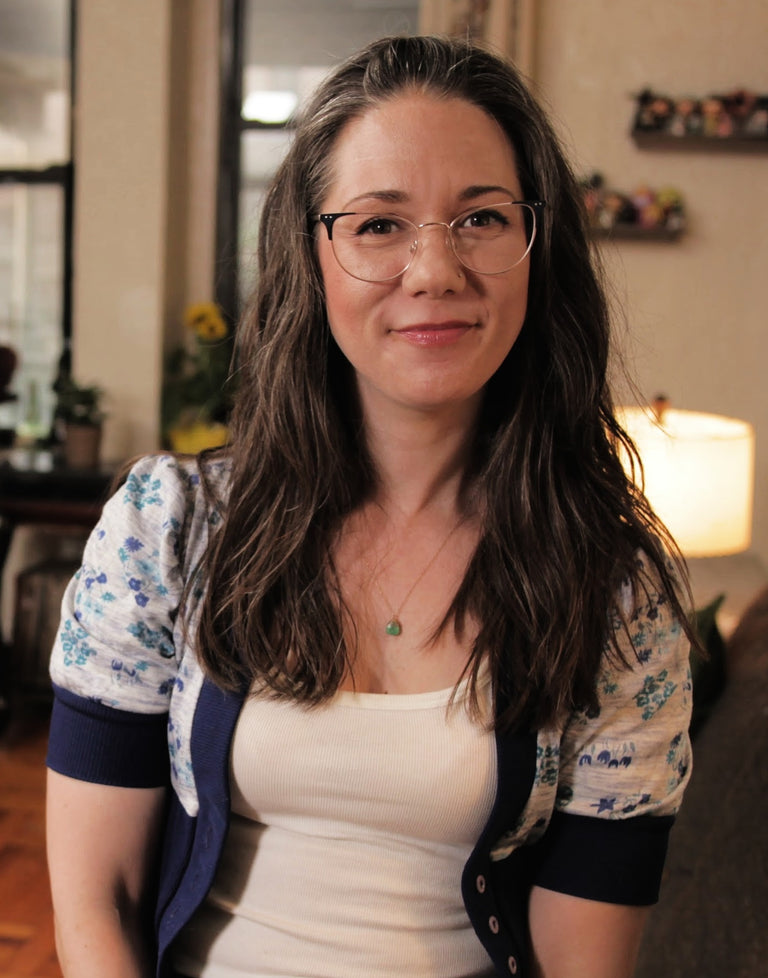Healthy hair starts with a healthy scalp, and a healthy scalp is flake-free. If you have small, white scales falling onto your clothes and you can’t seem to stop scratching your scalp, you’re not alone: the Journal of Investigative Dermatology estimates that 50% of adults worldwide suffer from dandruff at one time or another in their lives. That’s a lot of people!
But that doesn’t make it any less uncomfortable, or even worse, embarrassing, to deal with. Nearly everyone who has it will tell you that it feels like it never goes away or that they can’t seem to find the one thing that works for them to get dandruff to finally back off.
What causes dandruff? Who’s more likely to develop it? But more importantly: how can you effectively treat dandruff? We’re getting to the root of the problem, along with what you can do to deal with and prevent dandruff. Ahead, how to solve the common condition from both the inside and out and get the healthy, beautiful hair you've always wanted.
#include-related-slider#
What Is Dandruff?
We all know what dandruff looks like, but what causes it? Many folks think that scalp dryness is the culprit, causing itchy and flaky skin to be shed when your head is scratched. And that’s true, a dry scalp can produce the same symptoms as dandruff, but dandruff is a whole other can of, well, fungus.
Dandruff is actually caused by a yeast-like fungus called Malassezia globosa. Malassezia is found on almost every scalp, and it lives off the oils our scalps produce. When the fungus thrives and disturbs the natural balance of your scalp’s microbiome it can trigger dandruff, which leads to dead skin cells flaking off.
Shop: GRO Dry Shampoo 3-Pack
Is Dandruff Different from Dry Scalp?
One way to visually identify dry scalp over dandruff is through the appearance of the flakes. With dandruff flakes will appear to be more yellow (as opposed to white flakes) and will look oily. You might also notice your actual scalp is red, scaly or oily, too.
Another way to pinpoint dry scalp over dandruff? The actual feeling of your scalp. “In a dry scalp, unlike typical dandruff, the skin feels tight and uncomfortable,” explained Dr. Barry Goldman, dermatologist with Goldman Dermatology.
“Dry scalp can result from exposure to cold, dry air, stress, aging, or even overwashing. Or it can be a reaction to the soap, shampoo, or other hair styling products you use. These factors can draw moisture from the scalp, drying it out, and causing the skin to flake off,” added Dr. Zachary Okhah, medical doctor and surgeon with PH-1 Miami.
More On: Dandruff Versus Dry Scalp
Natural Treatments For Dandruff
If the thought of putting harsh chemicals or the by-products of coal production on your scalp seems less than appealing, the good news is that there are actually lots of home remedies or other natural approaches you can take to manage dandruff.
Use A Detoxifying Scalp Serum
VEGAMOUR has carefully formulated a 100% vegan topical scalp detox serum that harnesses the plant power of phyto-actives to help restore your scalp microbiome’s natural balance. We've developed the GRO Detoxifying Scalp Serum with one big guiding principle in mind: that in order to have a healthy productive scalp we need to care for it in the same ways we care for the rest of the skin on our bodies.
Zinc PCA works to absorb excess oils, which is a major contributing factor to dandruff. Epilobium Angustifolium (Willowherb) Extract safely reduces the appearance of adherent and non-adherent flakes. Wild-harvested baobab and marula oils provide additional antioxidant support in the form of Omega 6 and 9 fatty acids which further moisturize, protect and promote balance.
We’ve also included a proprietary vegan silk protein, Karmatin™, that gently removes persistent scalp buildup and actively helps to soothe scalp damage while providing a semi-permeable barrier, protecting the scalp from harmful environmental pollutants.
All that, and our customers report that they see a visible reduction in dandruff symptoms in as little as three days after initial use!
Apply All-Natural Topicals
There are several scientifically-backed and all-natural topicals you can experiment with to control dandruff and soothe the scalp:
Other topicals that have become anecdotally supported home remedies include baking soda, lemon juice and vitamin B—though more research will be needed to fully understand if and how they might help relieve dandruff.
Remember, most of these natural topicals will need to be diluted before application.
Take Care of Your Gut Health
Scientific research continues to uncover important connections between the health of our gut and our overall health and well-being. There is even a connection between our gut health and our hair!
“Your gut health has been linked to many things outside of your digestive system, including your mental health and mood. It also may manifest in your skin. One study found that taking probiotics-supplements that contain the beneficial bacteria that populate your gut-reduced dandruff by 57%.” shared Dr. Lam.
Not only that, but one case report outlined the success that two patients who were experiencing treatment resistant hair loss had with hair regrowth once they improved the microbiota in the gut.
Probiotic foods (including fermented foods like kombucha or kimchi) and supplements are one approach to support a healthy gut microbiome by adding beneficial bacteria, but you can also show your gut some love by choosing foods that will allow microbial communities to thrive on their own. Prebiotic foods like apples, bananas and barley will literally feed your gut microbiota, and they are another important tool in the healthy gut toolkit.
Read: Why a Healthy Scalp Is Important for Healthy Hair
Try A Calming Hair Supplement
Speaking of stress management and supporting healthier hair growth, VEGAMOUR has carefully formulated a hair supplement specifically designed to give your body everything it needs to grow healthy and more full-looking hair.
Wash Your Hair More Often
It might seem counterintuitive to wash a flaky scalp more often, but since dandruff is more about the fungus that produces flakes and the excess sebum that fuels the fungus, washing your hair more frequently will help reduce dandruff.
The frequency needed to manage dandruff varies from person to person, scalp to scalp. Some might need to wash twice a week, others daily. Experiment until you find the sweet spot for your scalp.
Consider adding a scalp massager to your cleansing routine. Our GRO Revitalizing Scalp Massager can help exfoliate flakes while also enhancing your wash to help gently remove excess oil.
Find Out: How to Exfoliate Your Scalp
Manage Stress
Seems like obvious advice, right? It’s not like the global pandemic has made stress management any easier, and a lot more folks are experiencing stress related hair loss than ever before.
While it’s generally accepted among doctors that stress can worsen dandruff, particularly among people with seborrheic dermatitis, there hasn’t been a lot of research looking specifically at the direct impact of stress on dandruff. That said, one cross-sectional study of 529 stressed-out medical students found that 49% of them were experiencing dandruff.
We can also expand the idea of stress beyond the typical emotional and psychological stressors we associate with everyday life to include physiological and environmental stressors.
Another form of stress that directly impacts scalp health and has been linked to dandruff is oxidative stress. Oxidative stress is what happens when our body is faced with an overload of free radical damage that it can’t manage.
Free radical damage and oxidative stress are the reason why you’ve heard it’s important to get enough antioxidants in your diet, and it’s why beauty products will include them to support healthy skin and slow the signs of aging.
There are many scientifically-backed ways to manage stress and bring your body back to a more balanced baseline: meditation, yoga, spending time in nature, and enjoying the company of pets, for example. So if you have dandruff, make stress management part of your hair wellness game!
Related: Everything You Should Know About Stress & Hair Loss
Conventional Dandruff Treatment
The first and most commonly used line of defense against dandruff is an anti-dandruff shampoo. Many anti-dandruff shampoos contain a number of different ingredients to directly control the fungus, control oil production, or to treat the symptoms (i.e. flakes):
- Pyrithione zinc is an antifungal agent that kills the fungus on your scalp
- Selenium sulfide will reduce the fungus’ presence but can change your hair color
- Ketoconazole also has antifungal properties
- Salicylic acid is an exfoliator often found in acne medications and other beauty products that removes excess scale from your scalp
- Coal tar is a by-product from the production of coal. It slows the growth and shedding of skin cells on the scalp. It might also change the color of your hair.
“The American Academy of Dermatology warns that some common over-the-counter shampoos contain ingredients like coal tar, which can make your scalp's skin more sensitive to sunlight. This can increase your risks of skin irritations and even skin cancer. Some active ingredients in conventional treatments may also discolor your hair, especially if you're blonde, or make dry out your hair and scalp,” shared Dr. Carrie Lam, medical doctor with Dr. Lam Coaching.
Shop: GRO Balance & Boost Kit
Who Gets Dandruff Most Frequently?
Anyone can develop dandruff, though there are some groups who tend to experience it more than others.
Men
Androgenic hormones, like testosterone, stimulate the oil glands in your skin and on your scalp. Since men tend to produce more of these hormones, they are affected by dandruff more often than women.
Also: 6 Ways to Tackle Scalp Buildup
Black Women
The Journal of Clinical and Aesthetic Dermatology conducted a study where they found that 44% of Black women reported a history of dandruff symptoms, such as excessive itching or scaling on their scalp. Treatment can become complicated by the fact that many over-the- counter dandruff shampoos might help the scalp but tend to dry out Black hair, where hair shaft dryness already tends to be a problem.
People With Oily Scalp
Since Malassezia globosa, the fungus that causes dandruff, feeds on the sebum (or oil) produced by the scalp, folks who have oily hair are more likely to develop dandruff since they’re inadvertently providing a hospital environment in which the fungus can thrive.
If you have oily hair and a particularly persistent or severe case of dandruff, it might be a case of seborrheic dermatitis, a chronic form of eczema that impacts areas of the body that secrete the most sebum.
All You Need To Know: Itchy Scalp & Hair Loss
When To Seek Professional Medical Advice
If you think you have dandruff and have tried some of the tips and tricks outlined above but aren’t seeing it improve, it could be time to see a doctor. If your skin is noticeable red or swollen and you've got an irritated scalp, you might have another skin condition that needs medical treatment.
When in doubt, see a doctor! They will be able to look at your scalp and hair to determine if it’s dandruff or something more serious. They can rule out skin conditions like eczema and psoriasis, which also cause flaky skin on the scalp.
Ask a Dermatologist: Does Dandruff Cause Hair Loss?
The Takeaway
Dandruff is a very common condition that affects the scalp due, most often, to dandruff causing yeast. While you might never cure your scalp of dandruff, there are many different ways you can effectively manage it. Taking care of dandruff and your general scalp health is an important way to ensure you can grow a healthy, thicker and fuller-looking head if hair! So make dandruff management a part of your holistic approach to hair wellness and up your scalp care game, because yes that's a thing.
Additional members of Team VEGAMOUR contributed to the reporting for this article.
More From VEGAMOUR
Back


















